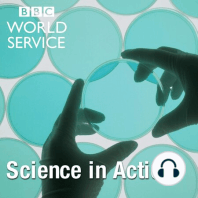28 min listen
Zoonotic hotspots and where to find them
ratings:
Length:
36 minutes
Released:
Jun 3, 2021
Format:
Podcast episode
Description
Researchers map where the riskiest areas are for viruses to jump from bats into humans. Also, synthetic bacteria with unnatural DNA, and the origin of the humble watermelon.
David Hayman of Massey University in NZ and colleagues have published in the journal Nature Food a study highlighting areas of the world where zoonotic transmission of coronaviruses are most likely to occur between humans and bats of the type most suspected of being the origin of the current SARS CoV2 virus. There are a lot of hotspots combining fragmented forest, livestock farming, human habitation, and populations of horseshoe bats. It is, as he says, just part of the evidence suggesting a natural origin in the areas of northern south-east Asia and southern China.
Jason Chin, Wes Robertson and team at the Laboratory of Molecular Biology have been tinkering with their work on synthetic organisms. By rewriting the dictionary of DNA itself, their new molecular alphabet is able to encode far more elaborate and innovative functions than even nature has ever produced. Publishing this week in the journal Science, their latest bacterium is even capable of being completely immune to viral infection. But as they describe, this could be just the start of what the new technology could deliver in terms of new materials and medicines.
Meanwhile, Susanne Renner has been tracking down some of human beings’ earliest genetic engineering. The selection and breeding of various fruits to produce sweet, sweet watermelon was long suspected to have originated in Africa, the question was where and when? Using a combination of genetic sequencing, ancient Egyptian art, and early modern paintings, she describes to Roland how what we now know as Sudan likely played a part in the story.
(Image: Horseshoe bat Credit: Getty Images)
Presented by Roland Pease
Produced by Alex Mansfield
David Hayman of Massey University in NZ and colleagues have published in the journal Nature Food a study highlighting areas of the world where zoonotic transmission of coronaviruses are most likely to occur between humans and bats of the type most suspected of being the origin of the current SARS CoV2 virus. There are a lot of hotspots combining fragmented forest, livestock farming, human habitation, and populations of horseshoe bats. It is, as he says, just part of the evidence suggesting a natural origin in the areas of northern south-east Asia and southern China.
Jason Chin, Wes Robertson and team at the Laboratory of Molecular Biology have been tinkering with their work on synthetic organisms. By rewriting the dictionary of DNA itself, their new molecular alphabet is able to encode far more elaborate and innovative functions than even nature has ever produced. Publishing this week in the journal Science, their latest bacterium is even capable of being completely immune to viral infection. But as they describe, this could be just the start of what the new technology could deliver in terms of new materials and medicines.
Meanwhile, Susanne Renner has been tracking down some of human beings’ earliest genetic engineering. The selection and breeding of various fruits to produce sweet, sweet watermelon was long suspected to have originated in Africa, the question was where and when? Using a combination of genetic sequencing, ancient Egyptian art, and early modern paintings, she describes to Roland how what we now know as Sudan likely played a part in the story.
(Image: Horseshoe bat Credit: Getty Images)
Presented by Roland Pease
Produced by Alex Mansfield
Released:
Jun 3, 2021
Format:
Podcast episode
Titles in the series (100)
Iran’s nuclear plans: What the threat to increase stockpiles of uranium really means by Science In Action
